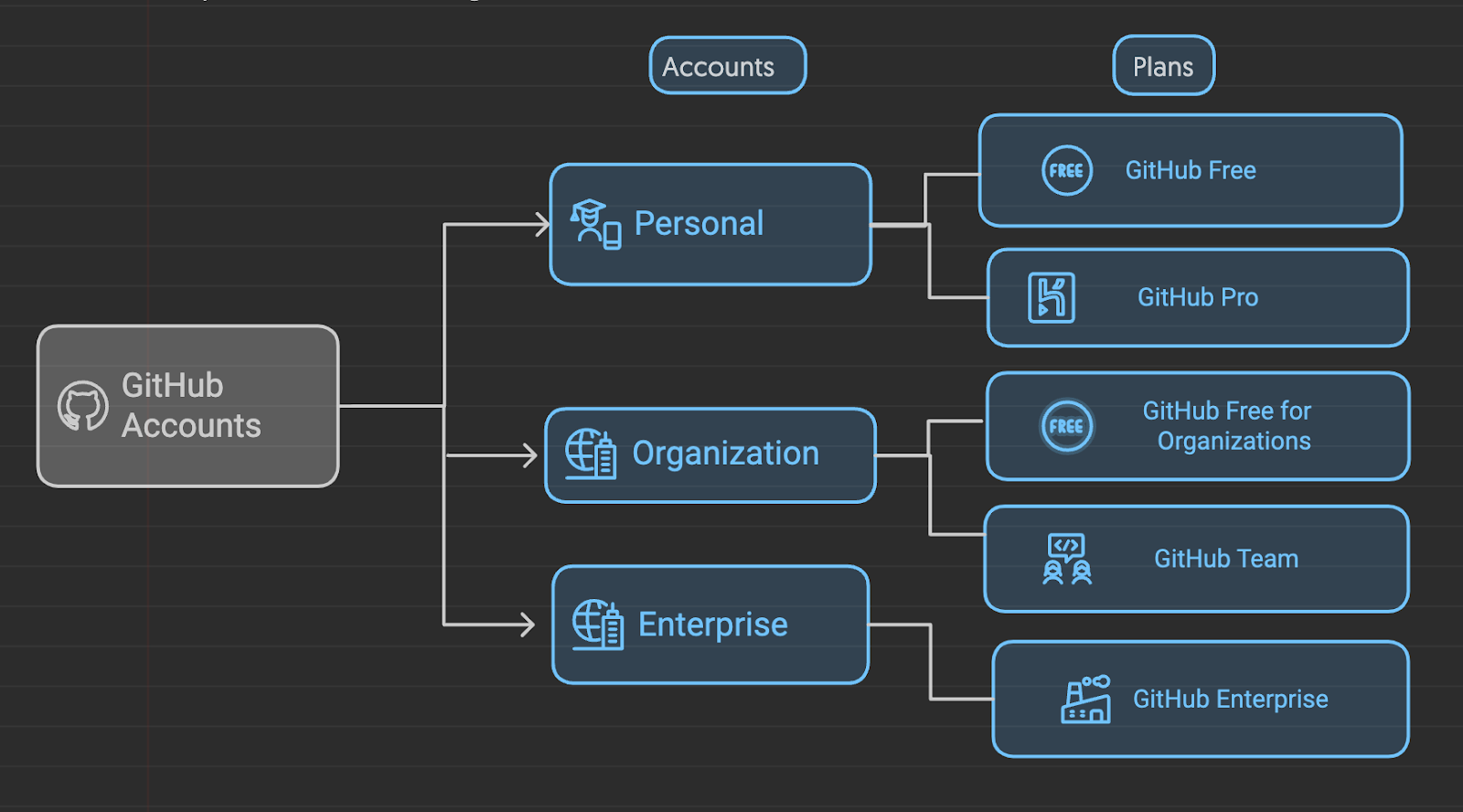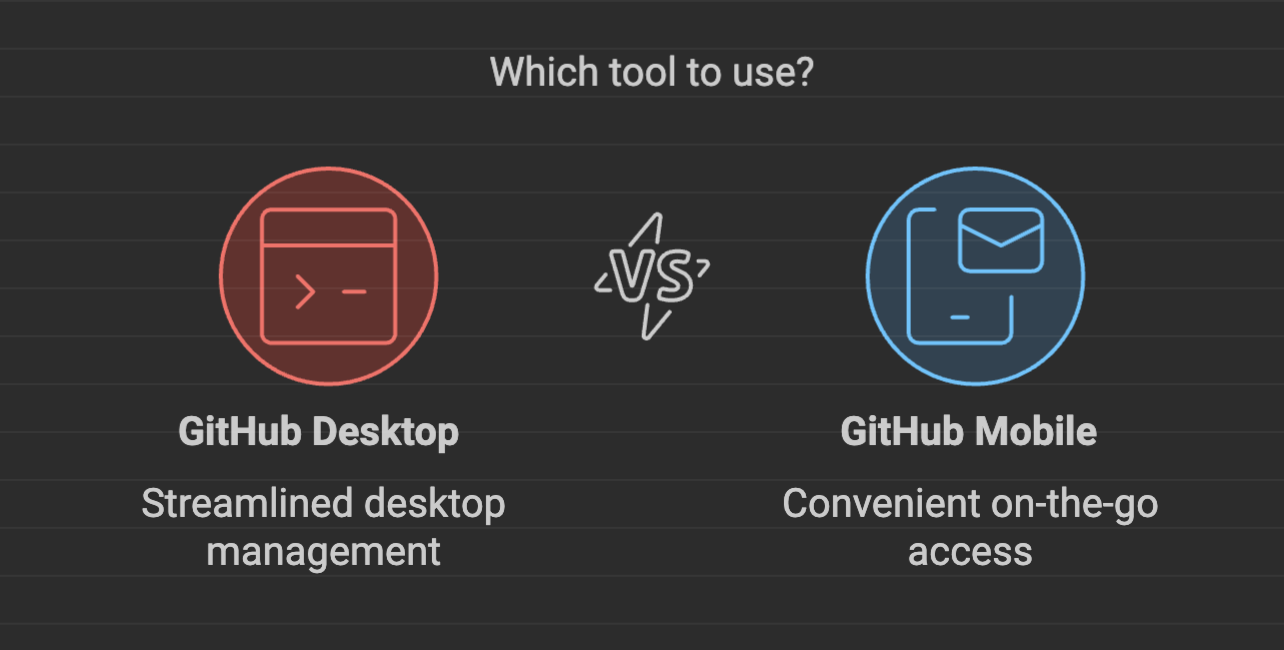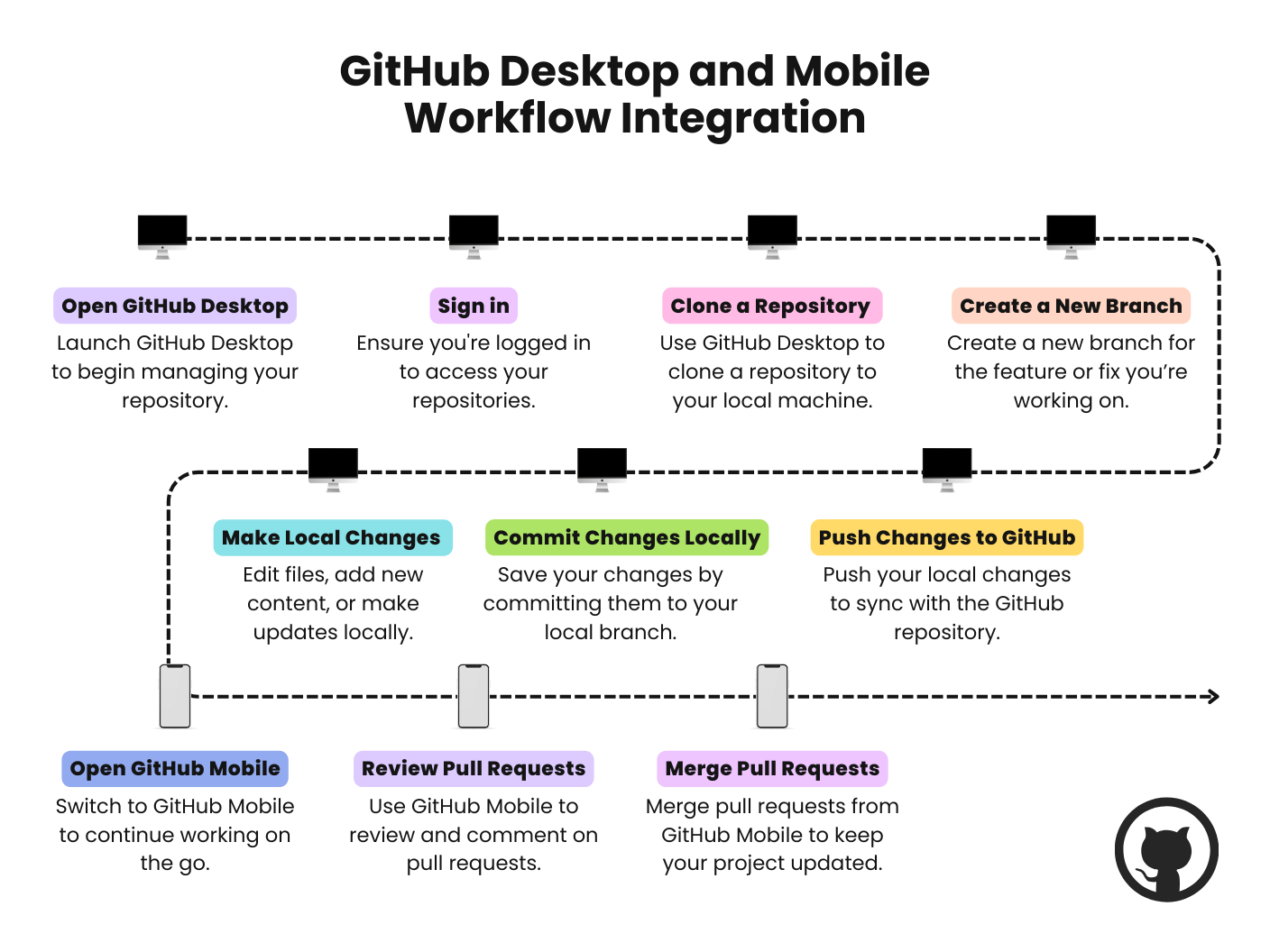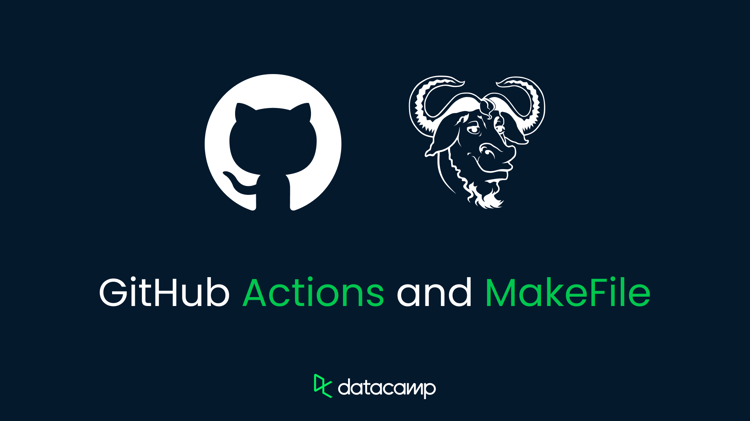Course
Developers all over the world use GitHub for collaboration, managing code, and for speeding up the timeline of their projects. In this article, we will explore GitHub’s different products, from free plans to enterprise solutions. We will highlight tools like GitHub Desktop and GitHub Actions that enhance productivity, and we will provide the right information so you can pick the right product for your own needs.
This guide also helps you prepare for the GitHub Foundations certification, which is an introductory certification offered by GitHub. If you are new to Git or GitHub, DataCamp's upcoming GitHub Fundamentals track will be an excellent starting point. This track will equip you with the skills needed to use GitHub and Git for data science and analytics projects. As a final resource, you can take our Foundations of Git course as a starting point to understand the basics.
Introduction to GitHub and Its Ecosystem
Many people know GitHub as a code hosting platform, but GitHub is really a lot more than that. It is also central to the whole software development process because it supports version control, which is a big part of project collaboration. Let’s take a look at the main GitHub products, which are designed to meet the needs of most users.
- GitHub Free: Ideal for individual developers or small teams, offering unlimited public and private repositories with basic collaboration tools.
- GitHub Pro: Adds advanced features like repository insights and additional storage, making it perfect for more experienced developers looking for extra capabilities.
- GitHub Team: This plan supports team collaboration with features like multiple reviewers on pull requests and advanced project management tools.
- GitHub Enterprise: This plan is for large organizations. It offers advanced security, compliance features, and flexible deployment options like GitHub Enterprise Cloud and GitHub Enterprise Server.
Additionally, GitHub provides additional tools like GitHub Desktop, GitHub Mobile, and GitHub Actions, all of which are designed for more experienced users who really want to enhance their productivity.
Overview of GitHub Account Types and Plans
GitHub offers different account types. Each account type provides a set of features suitable for different levels of collaboration and project management. To help you decide which GitHub account is right for you, use the simple decision tree below. It will guide you through some questions, helping you determine whether a Personal, Organization, or Enterprise account best fits your needs.

How to Choose the Right GitHub Account Type. Image by Napkin.AI
Personal Accounts
Personal accounts are perfect for individual users, such as freelancers or students, who need a straightforward way to manage their projects. With these accounts, users can access unlimited public and private repositories. Additionally, basic collaboration tools allow for minor team interactions, and GitHub Pages provide an option for hosting simple websites directly from your repositories. Personal accounts are split into two types, GitHub Free or GitHub Pro:
GitHub Free
The GitHub Free plan is available for both personal and organizational accounts. It provides essential features, including unlimited public and private repositories, GitHub Community Support, and basic GitHub Actions. This plan is ideal for individuals and small teams starting out with version control and collaborative coding. It allows users to host projects, collaborate with others, and automate workflows using GitHub Actions, though with limited resources.
GitHub Pro
GitHub Pro is designed for individual developers who need more advanced features to manage their projects. In addition to the features available in GitHub Free, Pro users get advanced repository insights, more GitHub Actions minutes, and increased storage for GitHub Codespaces. This plan is suitable for developers who want to dig deeper into their project analytics and need more resources for CI/CD pipelines and cloud development environments.
Organization and Enterprise Accounts
There are two additional account types that offer enhanced features for managing teams and projects: organization accounts and enterprise accounts. Organization accounts provide tools like role-based access controls, multiple reviewers on pull requests, and centralized billing. Enterprise accounts are designed for larger companies, offering advanced security measures like single sign-on (SSO), audit logs, and flexible deployment options. Both organization and enterprise accounts require additional resources and management, with enterprise accounts offering the highest level of control and security for large-scale operations.
GitHub Team
The GitHub Team plan is ideal for organizations that require enhanced collaboration features. It builds on the GitHub Free plan by adding tools designed to improve team workflows, such as multiple pull request reviewers, team reminders, and repository insights graphs. This plan is a good fit for companies that need to coordinate the efforts of multiple developers and maintain oversight or project progress.
GitHub Enterprise
GitHub Enterprise is the most advanced plan, offering extra security, compliance, and deployment controls. It is designed for large organizations that require a higher level of control over their development processes. Enterprise users can choose between GitHub Enterprise Cloud and GitHub Enterprise Server, depending on their deployment needs. This plan includes advanced security features like single sign-on (SSO), audit logs, and dedicated support, making it ideal for organizations that must comply with strict regulatory requirements.
When discussing GitHub Enterprise, it’s important to also mention managed user accounts. If you’re part of an enterprise account, you’re likely using a managed user account, meaning you’ll need to sign in to access your organization’s repositories. This is because companies want to maintain control over user activities. While you can still create private repositories, your ability to publish publicly or contribute to projects outside the company’s network will be restricted, which makes sense because companies need to be careful with that kind of thing.
Summary table
Here is a comparison table to help you see how all these GitHub plans stack up. The GitHub Free and GitHub Pro accounts are personal accounts; GitHub Team and GitHub Free for Organizations are organization accounts; GitHub Enterprise is (you guessed it) an enterprise account. Notice that you can use GitHub at no cost even though you are part of an organization and that GitHub Pro is designed as a sort of upgraded personal account.
| Account Type | Plan | Price | Repositories | Collaboration | GitHub Actions | Security & Compliance | Deployment Options | Ideal for |
|---|---|---|---|---|---|---|---|---|
| Personal | GitHub Free | Free | Unlimited Public and Private, but with a limited feature set | Basic Tools | 2,000 Minutes | Basic | Cloud Only | Individuals, freelancers, students |
| Personal | GitHub Pro | Free | Unlimited Public and Limited Private | Team Access Controls | 2,000 Minutes | Basic | Cloud Only | Developers needing advanced tools |
| Organization | GitHub Free for Organizations | Free | Unlimited Public and Private | Advanced Tools | 3,000 Minutes | Advanced | Cloud Only | Small teams with basic needs |
| Organization | GitHub Team | Monthly/Yearly Subscription | Unlimited Public and Private | Multiple Reviewers, Team Tools | 3,000 Minutes | Advanced | Cloud Only | Teams needing advanced collaboration |
| Enterprise | GitHub Enterprise | Custom Pricing | Unlimited Public and Private | Enterprise-Grade Tools | Custom Minutes (Cloud: 50,000) | SSO, Audit Logs, Compliance Controls | Cloud or On-Premise | Large organizations needing high security and control |
GitHub’s Complementary Tools
In addition to its core products, GitHub offers several auxiliary tools that support developers. These tools are designed to make it easier to manage repositories, collaborate with others, and stay connected with projects in the event that you are traveling or working remotely.

GitHub Desktop and GitHub Mobile. Image by Napkin.Ai
GitHub Desktop
GitHub Desktop is a user-friendly application that simplifies the process of managing your repositories locally. It provides a graphical interface that allows developers to handle the Git and GitHub workflows without using the command line. With GitHub Desktop, you can clone repositories, create branches, commit changes, and push updates with just a few clicks. This tool is particularly useful for developers who prefer a visual approach to managing their code, as it eliminates the need for complex Git commands while still offering good functionality.
GitHub Mobile
GitHub Mobile lets you stay connected with your projects wherever you are. You can do all or most of the main features directly from your phone, such as review code or merge pull requests. That said, GitHub Mobile is not going to be a replacement for your main workflow; it’s really more of a nice addition. I would say that GitHub mobile is especially useful because it helps you pay attention to important notifications and resolve issues quickly since you carry your phone everywhere. Take a look at the flowchart below, which shows an example of GitHub Desktop and Mobile workflow integration.

GitHub Desktop and Mobile Workflow Integration. Image by Author
GitHub Billing, Licensing, and Notifications
GitHub offers both subscription-based and usage-based billing models, catering to different user needs and project scales.
Billing structure
GitHub’s billing is divided into two main modes: subscription-based and usage-based.
- Subscription-Based Billing: This model includes plans like GitHub Free, Pro, Team, and Enterprise, each with a fixed monthly or yearly cost. The Free plan is suitable for developers with basic needs, while the Pro plan offers enhanced features for developers at a higher cost. The Team plan provides collaborative tools at a per-user rate, and the Enterprise plan caters to larger organizations with advanced security and compliance features. Licensing for the Enterprise plan is typically based on the number of users, with a recently introduced metered billing model that adapts to usage.
- Usage-Based Billing: This model applies to services like GitHub Actions, GitHub Packages, and GitHub Codespaces. While these services include free quotas, additional usage incurs extra costs. For example, GitHub Actions allows workflow automation with free minutes, but usage beyond this limit is billed. Similarly, GitHub Packages and Codespaces charge for storage and compute time that exceeds the included quotas.
Managing costs
To help manage costs, GitHub allows organizations to set spending limits for services like Actions, Packages, and Codespaces. These limits prevent additional usage beyond a specified budget, avoiding unexpected charges. GitHub also provides detailed usage reports and a billing dashboard, enabling organizations to monitor their expenses closely. This proactive cost management helps teams stay within budget.
Managing notifications and subscriptions
GitHub notifications are extremely helpful. They will inform you whenever important changes are made to your repository. Because it’s important to know when changes are happening in a collaborative project, GitHub provides several options for managing these notifications.
For one thing, you can receive notifications via the web interface, email, or through GitHub Mobile, all of which sync together. What is more, these notifications can be customized so you only hear about the things that you care most about. If, for example, you want to hear about pull requests but don’t need to hear the chatter in the discussions, you can keep the notifications for the pull requests on but put the conversation on mute.
Also, you can configure email filters or decide to be alerted for specific events like workflow runs or security alerts. The notifications are such a useful feature in GitHub that many people use them as a sort of triaging tool. For example, you can mark certain notifications as "Done" or save some of them for later review.
Conclusion
In this article, we explored the range of products that GitHub offers, from free plans to enterprise solutions, and highlighted the tools and features that make it the well-known platform that it is. GitHub’s strong community support, combined with its comprehensive set of tools, ensures that you can manage your projects efficiently and collaborate effectively, whether you are an individual developer or part of a team.
The development world keeps changing. Stay up to date by listening to the DataFramed Future of Programming podcast episode, which has some insights into the ever-evolving role of GitHub in software development. For hands-on practice, take the Introduction to Git course, which is perfect for beginners. More advanced users might benefit from the Makefile and GitHub Actions tutorial to leverage automation in their workflows.
Learn Git Fundamentals Today
Experienced data professional and writer who is passionate about empowering aspiring experts in the data space.
Frequently Asked GitHub Questions
Is GitHub free?
GitHub offers both free and paid plans.
Who should use GitHub Team?
GitHub Team is designed for organizations that need enhanced collaboration features like multiple reviewers and advanced project management tools.
What certifications does GitHub offer?
There are numerous GitHub certifications, but the fundamental one is the GitHub Foundations certificate. It is ideal for beginners looking to gain foundational Git and GitHub skills.
What are GitHub Actions?
GitHub Actions automate workflows such as building, testing, and deploying code.
Can managed users access personal repositories?
No, managed users do not have access to personal repositories. They can only access repositories and resources that are part of the enterprise organization.


